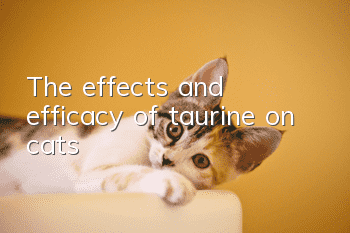The effects and efficacy of taurine on cats

Every cat and dog needs a lot of nutrients if they want to grow healthily. Among them, there is a very important nutrient for them, called taurine
If you are a novice poop scooper, then you must follow Nike to fully understand the concept of taurine and better maintain the health of cats and dogs.
What is taurine?
Taurine is a sulfonic acid with amino groups. Taurine plays an extremely important role for dogs and cats. Taurine is widely distributed in the brain, heart, liver, kidney, ovary, uterus, skeletal muscle, blood, saliva and milk of humans and animals in the form of free amino acids. Especially in the hearts of animals, free taurine accounts for as much as 50% of the total free amino acids.
Is taurine good for dogs and cats?
The answer is yes! Taurine plays a vital role in the body functions of cats and dogs. Here is the explanation for you:
• It can maintain the point balance of dog and cat cell membranes and help electrolytes such as sodium, potassium, calcium and other ions enter and exit cells
• Can accelerate the proliferation and extension of neurons, thereby strengthening the neurological function of the pet’s brain
• Can also adjust retinal function
Both dogs and cats can use taurine to synthesize bile acids. When the diet contains appropriate levels of sulfur-containing amino acids, dogs can synthesize taurine themselves to meet nutritional needs;
But for cats, because of their low activity of cysteine dioxygenase and cysteine sulfinate decarboxylase in their bodies, their ability to synthesize taurine is limited.
At the same time, the cat’s ability to absorb bile salts in the enterohepatic circulation is limited, and most of the taurine is excreted in the feces. Cats need to continuously provide taurine to replenish the lost taurine, so taurine is the most important component of cats. of limiting amino acids.
Then this lack will affect the cat
What impact does it have on the body?
For cats, when taurine is deficient
• The cat’s photoreceptor cell membrane ruptures and loses function, eventually leading to cell necrosis and apoptosis
• Retinal degenerative degeneration (FCRD) is defined as the classic symptom of taurine deficiency in cats
• Taurine deficiency can also cause dilated myocarditis (DCM) in cats
• A lack of taurine in female cats can easily cause miscarriage, reduce the survival rate of kittens, and may even cause sudden death
Therefore, taurine is more important for cats.
Common sources of taurine
Taurine only exists in animal raw materials and is abundant in muscle tissue and seafood raw materials. Plant raw materials almost contain no taurine. Raw materials containing higher taurine include cod, mutton and lean pork.
Currently, NRC recommends taurine dosage for cats as 400mg/kg of diet, and AAFCO recommends taurine dosage as 1000mg/kg dry food and 2000mg/kg wet food. However, in actual commercial products, 1000mg is often added to dry food. Taurine/kg diet, wet food and canned food are often added to 1700mg/kg diet.
Too many grains and low protein content in dietary formulations can cause taurine deficiency. Although dogs can synthesize taurine on their own, if they are fed a plant-based protein diet, it can easily cause taurine deficiency in the dog. This is mainly because the protein composition of plant-based protein diets such as soybean meal has a higher content of sulfur-containing amino acids. Caused by low.
- When is the best age to neuter a cat?
- Symptoms and Treatment of Feline Coccidiosis
- Is it better for cats to eat cat food? The correct way to feed cats!
- Analysis of the causes of cats’ loss of appetite, a must-read for cat owners!
- How do cats vomit hairballs? How does a cat spit out hairballs to eat?
- Symptom classification and treatment methods of several common cat skin diseases
- What are the symptoms of cat kidney failure?
- The cat can’t walk when it puts on the shoes? How does the cat behave after putting on the shoes?
- Can cats drink milk? You will understand after reading this!
- The cat has a hoarse voice but is in good spirits



